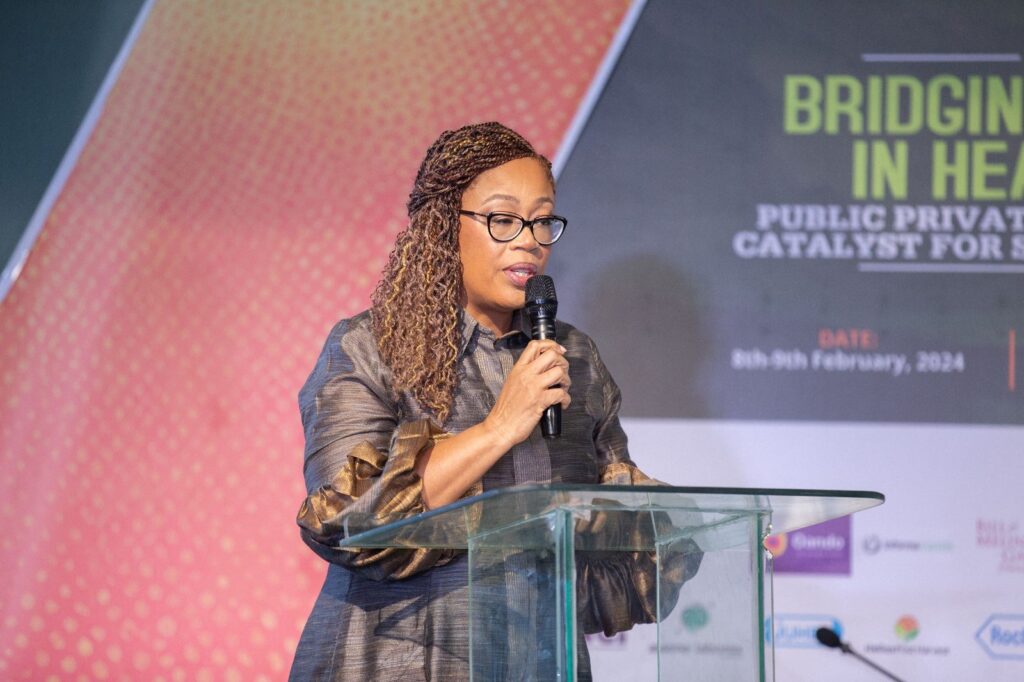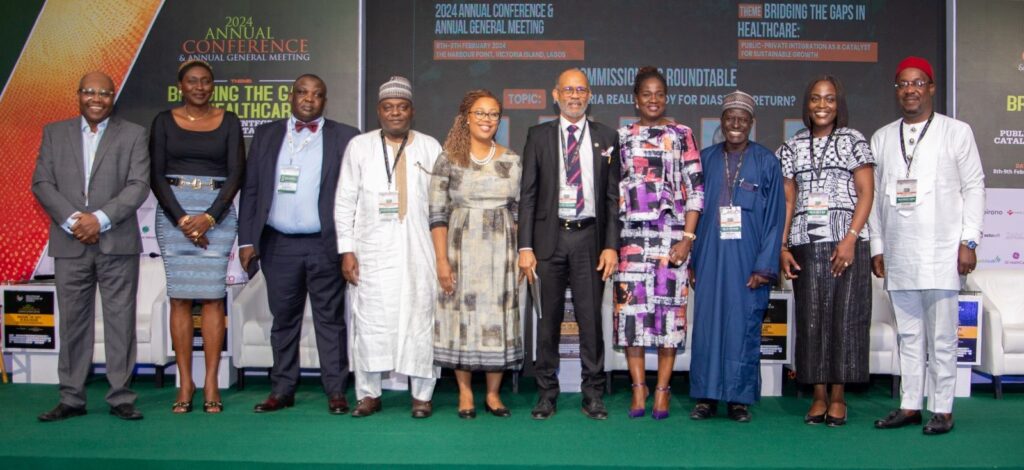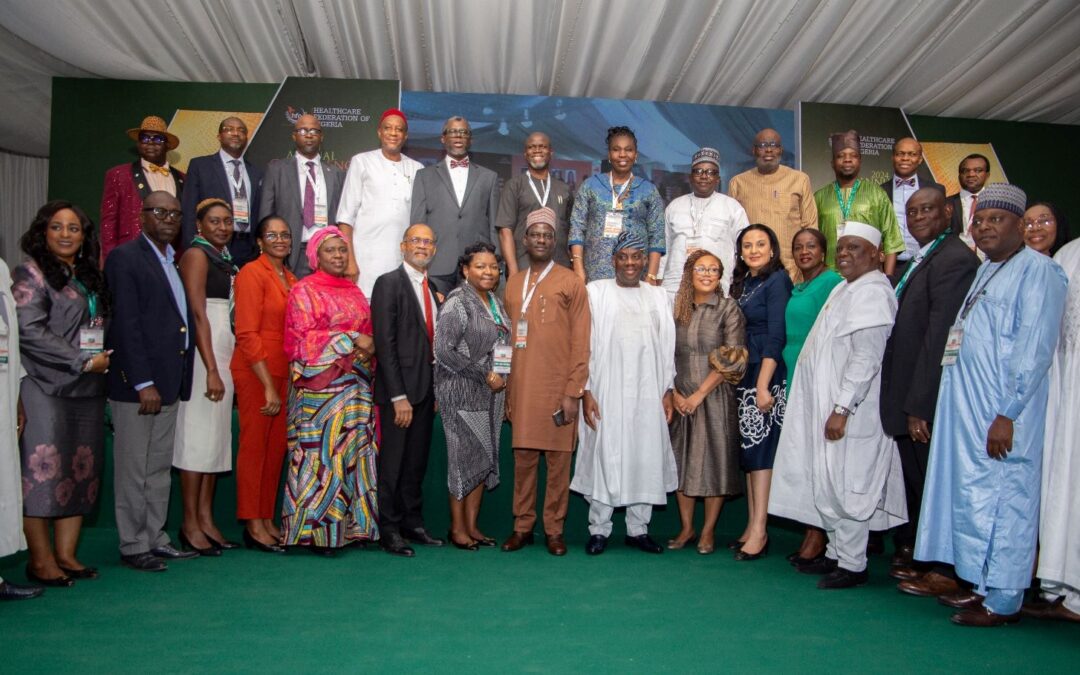Public-private integration was the main theme of the Healthcare Federation of Nigeria (HFN) Conference 2024. This event brought together public and private sector leaders to discuss and implement solutions for Nigeria’s healthcare challenges. Several prominent organizations sponsored the conference, including Advantage Health Africa. This company is the leading force in the health and pharma industry. The conference focused on how to improve healthcare delivery, access, quality, and affordability for all Nigerians.
The President’s Call to Action
Dr. Pamela Ajayi, the President of HFN, opened the conference with a powerful speech. She talked about the urgent need to address the human resource and infrastructure gaps in the healthcare sector. She said the healthcare system was “broken and dysfunctional”. She said public-private integration was the only way to achieve sustainable growth and development in the healthcare industry.
Dr. Ajayi urged the stakeholders to face the stark realities of Nigeria’s healthcare challenges. She said they should not shy away from the hard truths and difficult decisions. She challenged them to bridge the sectoral divides and prioritize public-private collaboration. She said this was the key to unlocking the potential of Nigeria’s healthcare sector. She inspired and motivated the audience to work together to fix the broken system and pave the way for a brighter tomorrow.

The Commissioners Round Table
The commissioners round table were another highlight of the conference. It featured the commissioners of health from different states, who shared their insights into their respective healthcare landscapes. They discussed the topic of whether Nigeria was really ready for diaspora return. They explored the challenges and opportunities of attracting and retaining the diaspora talent and expertise in the healthcare sector. They also discussed the role of public-private collaboration in creating an enabling environment and a supportive system for the diaspora engagement.

Panel Sessions
The conference featured nine panel sessions that covered various topics and issues related to public-private integration in the healthcare sector. The panel sessions were:
- Government Health Sector Policy Reforms: The panelists discussed the challenges and incentives for private sector participation in the healthcare sector. They shared their perspectives and experiences on the policy environment and the regulatory frameworks that affect the private sector. They also highlighted the opportunities and benefits of public-private collaboration and the need for alignment and coordination among the different levels of government.
- Fostering Public-Private Integration in Healthcare Transformation: The panelists discussed the challenges and opportunities of public-private integration in healthcare transformation. They explored the current state and future prospects of public-private integration and how to overcome the barriers and leverage the enablers for effective and efficient healthcare delivery. They shared their insights and best practices from various fields, such as health financing, health insurance, health management, and health technology.
- Making Healthcare More Investable: The panelists discussed the strategies for making healthcare more investable and provided a deep dive into the market dynamics and opportunities. They shared their insights and experiences on the investment landscape and the potential returns and risks of investing in the healthcare sector. They also discussed the best practices and success factors for attracting and retaining private sector investment and innovation.
- Reviving/Revolutionizing Pharmaceutical & Health Products Manufacturing: The panelists discussed the revival and revolution of pharmaceutical and health products manufacturing through public-private synergies. They shared their views and challenges on the local production and supply of essential drugs and health products. They also discussed the role of public-private partnerships in enhancing local capacity and quality, reducing dependency on imports, and creating a competitive and sustainable market.
- Strategic Partnerships for Supply Chain Optimization: The panelists discussed the strategic partnerships for supply chain optimization and the creation of special health channels for fast tracking healthcare goods. They shared their solutions and best practices for improving the efficiency and effectiveness of the healthcare supply chain. They also discussed the role of public-private collaboration in creating special health channels that would facilitate the movement and delivery of healthcare goods, especially in times of emergencies and crises.
- Reducing Out-of-Pocket Payments: The panelists discussed the reduction of out-of-pocket payments and the challenges and opportunities for enhancing healthcare access and affordability. They shared their analysis and recommendations on how to reduce the financial burden and improve the financial protection of the healthcare consumers. They also discussed the role of public-private integration in expanding the coverage and quality of health insurance and health services.
- Integrating Artificial Intelligence & Technology: The panelists discussed the integration of artificial intelligence and technology for efficient health service delivery. They shared their innovations and applications of artificial intelligence and technology in the healthcare sector. They also discussed the role of public-private collaboration in fostering a conducive environment and a supportive ecosystem for the adoption and diffusion of health technology.
- Diaspora Engagement: The panelists discussed the diaspora engagement and how to catalyze sustainable health development. They shared their contributions and experiences in supporting and advancing the healthcare sector in Nigeria. They also discussed the role of public-private collaboration in engaging and mobilizing the diaspora for health development.
- Igniting Innovation & Startups: The panelists discussed the ignition of innovation and startups and the development of a public-private healthcare governance blueprint. They shared their stories and challenges of creating and scaling up innovative solutions for the healthcare sector. They also discussed the role of public-private collaboration in creating a governance framework and a policy agenda that would enable and support the growth and sustainability of the healthcare innovation and startup ecosystem.
The Conclusion
The HFN Conference 2024 was a successful and impactful event that provided a platform for visionary discourse and collaborative action towards public-private integration. The conference showed the achievements and challenges of the public and private sector, and the opportunities and benefits of public-private integration. The conference also empowered the stakeholders to take action and implement solutions for the common good of the nation and its people.
The conference was a testament to the collective ambition and unwavering dedication of the HFN, Advantage Health Africa, and all the other sponsors, speakers, and participants. They shared a common vision and mission of shaping a healthier future for all.

 We use cookies to ensure that we give you the best experience on our website. If you continue to use this site we will assume that you are happy with it.
We use cookies to ensure that we give you the best experience on our website. If you continue to use this site we will assume that you are happy with it.